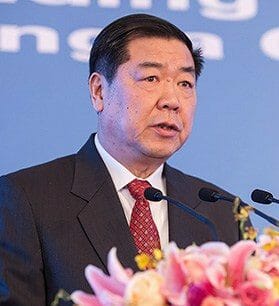
NDRC chairman He Lifeng wants more people in China’s smaller cities.
Editor’s note: This article provides a round up of recent regulatory moves in mainland China, along with insights into the impact that these new measures may be having on the market. This new element of Mingtiandi now appears on the site weekly, each Wednesday.
NDRC Strikes Down Residency Restrictions in Cities of Under 3 Mil
The National Development and Reform Commission has called for a “thorough loosening” in requirements for obtaining local residency in cities with urban populations of from three million to five million people, according to a notice published on Monday by China’s top economic planning authority. In the same notice the NDRC instructed authorities in cities with one million to three million in urban population to scrap all such restrictions on migrants to the city being granted residency.
The notice marks the latest step in China’s ongoing reform of its hukou residency control systems as the central government tries to encourage migration from the countryside into small and middle-sized cities — a move which seen is by many analysts as giving a boost to local property markets in the affected areas. Read more>>
Hangzhou Encourages Degree Holders to Become Home Buyers
Hangzhou is now allowing university graduates or those with higher education who work and pay social security in the city to secure local residency, according to an announcement published on April 3rd. Along with the favourable policy for degree holders, the city government has also granted home-buying quotas for qualified employees in enterprises which pay over RMB 100 million in taxes annually.
The capital of Zhejiang province has long restricted housing purchases by non-residents including requiring proof of having paid taxes or social security in Hangzhou for at least 24 months to qualify for buying their first home. Read more>>
Beijing Housing Market Jumps 164% From Feb to March
Beijing’s market for second-hand housing has shown signs of rebound recently as it saw a record 16,051 second-hand homes change hands in March, the highest monthly total since last May 2018 and an increase of about 164 percent compared to February’s total.
However, analysts from local research institute Ke Research attributed the recovery to seasonal factors since the Chinese property markets often see cyclical rebounds after the lunar new year holiday, which occurred in February each year. Read more>>
Cental Bank Mouthpiece Warns Against “Market Rebound” Frenzy
A nationwide rally in China’s housing market in the future is unlikely despite recent upticks in top-tier cities such as Beijing and Shenzhen, according to an editorial published in the Financial News, an official newspaper owned by the People’s Bank of China.
The government media commentary assigned the recent burst of activity to short-term volatility which was affected by both the season and expectations of easier policy. The editorial also pointed out that the market remains uncertain as domestic developers continue to struggle through an industry restructuring, which knock out players which lack land reserves. Read more>>
Developers Spark Up Hainan Sales as Policy Relaxed
Hainan is experiencing a surge in home sales fuelled by relaxed rules on home purchases for skilled migrants to the city, according to industry sources in the island province interviewed by The Paper.
A new Hainan project by Country Garden sold out all 108 units on its first day of sales in late March and developers are welcoming the new level of consumer interest aft suffering through a long sale drought following a government crackdown last year. Read more>>
Banks in Hangzhou Lower Mortgage Rates for New Buyers
The four major state-backed banks in Hangzhou, including the Industrial and Commercial Bank of China, Bank of China, China Construction Bank, Agricultural Bank of China, as well as some commercial banks in the city, have started to offer discounted mortgages for first-time home borrowers.
Mortgage rates for first-time home buyers had been as high as 10 to 20 percent above the benchmark rate, before reserve ratios were cut earlier this year. Since mid-March, however, some consumers are now able to secure mortgages at five percent above the benchmark, according to media accounts. Read more>>
Tune in again soon for more China policy news and be sure to follow @Mingtiandi on Twitter, or bookmark Mingtiandi’s LinkedIn page for headlines as they happen.
Leave a Reply